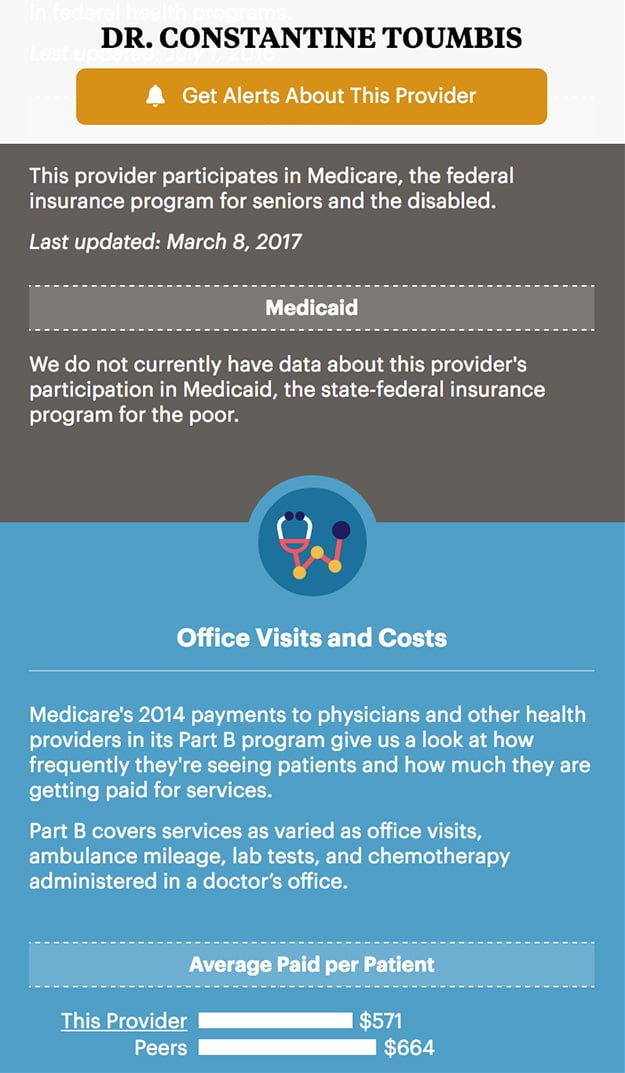ProPublica has accumulated a wealth of data about how medicine is really practiced in the U.S. We’ve got millions of data points on things we believe everyone should know about his or her providers, like whether they’ve been barred from federal health care programs, their prescribing and treatment patterns, and how much money pharmaceutical companies pay them for things like consulting and speaking.
Today we’re launching a project called Vital Signs that puts the most important information from across all of our health care projects in one easy-to-use place, and can alert you when we get new information or when something happens you should know about right away, for example if your provider is now paid more per patient than 90 percent of peers, which may be a sign of overtreatment or use of more costly services.
Our health care databases, including Dollars for Docs and Prescriber Checkup, have long been among the most popular features of our site, and are a key part of the mission of our data team — to help people use data to make better choices and live better lives. We’ve spent years collecting, cleaning and analyzing data about hundreds of thousands of doctors and other health professionals across several different interactive databases. Vital Signs lets you see what matters most across all of them, and dig deeper to explore even more data.
It’s split up into five general sections:
- Standing With Federal Health Programs
- Office Visits and Costs
- Relationships with Pharmaceutical and Device Companies
- Prescribing Patterns and Habits
- Surgical Performance
Each section is color coded to make it easy to understand, and includes only the most important insights into that provider’s practice. For most data points we give you a way to compare a given metric with the provider’s peers, so you can see if he or she is doing things much differently — which may be worth talking to your provider about.
Not all medical providers have data in each section. Obviously, if a doctor is not a surgeon, or does not perform the surgeries we’ve got data on, you won’t see anything under Surgical Performance on that doctor’s page. Likewise, if a healthcare provider doesn’t treat Medicare patients — say a pediatrician — you may not see any data under the sections that rely on publicly available records provided by the Centers for Medicare and Medicaid Services.
New to this project is data on health care providers who have been kicked out of government health programs. For the first time, you’ll be able to see your provider’s standing.
Vital Signs can also send you email notifications every time we update the data or if we spot something new or something important changes for your provider. It’s designed for mobile devices, so you can easily pull up this information while at your doctor’s office or in other care settings.
The data in Vital Signs is also a jumping off point for you to dive in further based on what you’re interested in. Each section corresponds to a much deeper and more detailed set of data on that provider. You’ll see links under the “Dig Deeper” subheading that will let you see everything we know about that subject for that provider.
The data across all of our health care databases is updated throughout the year — as often as monthly but more often once or twice per year. You can subscribe to alerts in Vital Signs and we’ll email you whenever we update your doctor’s record. If something critical changes about your provider — for instance, if he or she has been banned from participating in federal programs like Medicare or Medicaid — we’ll email you as soon as the data reflects that.
One last thing: If you use health care data professionally, the data in Vital Signs is available via API. You can use the API to match what we know about providers with other information, as long as you know their NPI numbers. (Read more about the API on the ProPublica Nerd Blog.) For now, the API is only available to a limited number of applicants, but we’ll be welcoming more users in the month ahead. You can read the documentation and sign up to join the waitlist on the Data Store website.





